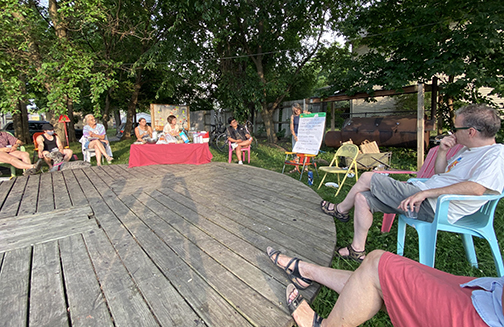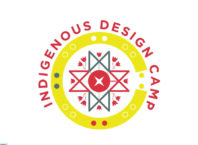
By Hannah Broadbent
“I don’t know how to talk about what it’s like to live on ‘Columbus Avenue’ without standing on a soapbox talking about everything that is wrong with colonization,” Quito Ziegler said at the Oyate Avenue information sharing and community meeting in Minneapolis.
‘Oyate Avenue’ is the name that a group of community members would like to change ‘Columbus Avenue’ to. ‘Oyate’ was given to them by Makoce Ikikcupi, a land recovery project based in Minnesota. It simply, means “the people”.
The group of community members heading the place-based initiative identify themselves as white-settlers from varied linages who live or have lived along “so-called Columbus Ave”. The avenue runs from 18th street to 62nd street and crosses 4 wards in Minneapolis.
Their website reads: “This project aims to change the name of the Avenue in South Minneapolis as a step towards living in the right relationship with each other. We don’t want to live on a street that evokes domination, theft, loss and grief.”
June 16 was the first public meeting on the potential name change. It took place in the heart of the movement at 33rd and Columbus, in Dreamland community space and garden.
“This is a landback initiative,” said organize Josina Maltzman. “We want to invite community in and share about this work because it’s going to be a lot of work.”
There were around 20 community members present at the public discussion. Several of them being the white-settler organizers, every attendee being from the neighborhood.
Maltzman says she can recall the disdain for the name existing since she moved in, in 2008. Though block members can recall it going back another 20 years.
“A lot of us would talk about our address as 33–f*** Columbus Avenue,” she said.
Maltzman said it was summer of 2020 that triggered a few street artists to take it upon themselves throughout the avenue to paint over the signs with a different name. On 38th and Columbus the avenue sign is now red and reads “Little Crow”.
Resident Griffin Jefferies agreed that after a decade of name-change conversation, last summer’s revolutionary feel took a hold of him. He noted a lot of white community members coming into new consciousness around racism and asked how he can help translate that commitment into the Indigenous community as well.
“There was this energy and so much neighborhood organizing, that it really felt like people were connecting in this different kind of way.” He said. “So, with block connections happening and more people getting politicized in different ways it felt like there could really be momentum around this now to move forward and work with the organizing that was already happening.”
June’s meeting was meant to be an info session with community sharing and how, why and if people would support this change as well. Aside from a few hesitancies around whether the name change was big enough or perhaps just optics, even those were immediately pushed to the side and replaced with complete support.
“As a trans person I can appreciate the significance of a name change,” Zeigler said. “It’s perhaps small in comparison with the systemic harms at work, but it is a visible change and it is a very important step.”
Like our Indigenous relatives who understood the importance of a name, even traditionally changing names with phases of life or significant events, the small in-person group of 20 and almost 600 people who follow ‘Oyate Avenue’ Facebook page are on board.
“Now the hard part starts, but this work is a responsibility,” Maltzman said.
The group has specified two ways in which they can officially change the name of the street. First, they can collect signatures from 2/3 of all people who own property abutting the Avenue. The petition fee is $300. Second, they can urge the mayor, a city council person or the Director of Public Works to submit a petition. In that case, the petition fee would be waved.
They note that in either case, Minneapolis Public Works will consider whether there will be a “public benefit that clearly outweighs the public confusion and cost that would be created by the name change” as stated in the street naming policy. After that, the city charges $200/intersection to change the street signs. Finally, all residents will have approximately one year to change their ID’s, and will need to update all other personal info.
With all the street signs from 18th to 62nd it would cost around $7,800 to pay for all the street signs. The group is hoping to raise $15,000 to pay for the new signs but also to have a cache of money for neighbors that would need assistance with updating their ID’s and any other assistance residents may need.
“The city doesn’t make it easy,” Maltzman said. They said their calls for help to the city were usually returned with little to no knowledge on how to perform a street name change because the ‘city hardly ever does them’.
The most recent street name change was ‘Bde Maka Ska Parkway’. In 2017, the Minneapolis Park Board voted unanimously to recommend changing the lake’s name back to Bde Maka Ska (the original name the Dakota people called it) and the Hennepin County commissioners agreed. In January 2018, the Minnesota Department of Natural Resources (DNR) made Bde Maka Ska the official name in Minnesota.
“Of course, the goal is to change the name, but the ultimate goal is education, outreach and decolonization,” Maltzman said.
The meeting adjourned with fundraising, planning and event committees.
To participate or learn more, go to their website at: oyateavenue.org, or see their Facebook page online at: facebook.com/oyate.avenue.






